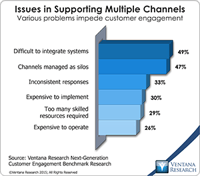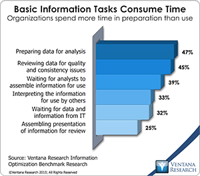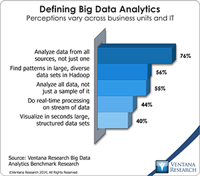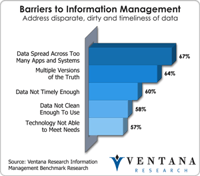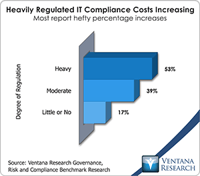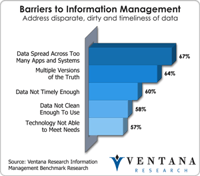This has been a dramatic year for Informatica, a major provider of data integration software. In August it was acquired and taken private by Permira funds and Canada Pension Plan Investment Board for about US$5.3 billion. This change was accompanied by shifts in its management. CEO Sohaib Abbasi became chairman and now has left, and many executives were replaced while Anil Chakravathy became CEO from being the Chief Product Officer. The new owners appear to have shifted the company’s strategic...
Read More
Topics:
Big Data,
Data Quality,
Master Data Management,
MDM,
Operational Performance Management (OPM),
Cloud Computing,
Data Integration,
Data Management,
Data Preparation,
Governance, Risk & Compliance (GRC),
Informatica,
Uncategorized,
Business Performance Management (BPM),
Information Management (IM),
Information Optimization,
Risk & Compliance (GRC)
Organizations today create and collect data at ever faster rates, and this introduces challenges in ensuring that data is not just managed but used in a consistent manner for a range of operational and analytic tasks. This is made more difficult by new data sources whose definitions vary from standard and widely used formats. Making all information available and consistent is essential to support business processes and decision-making. A key technology tool for this effort is master data...
Read More
Topics:
Big Data,
Data Quality,
Master Data Management,
Social Media,
Golden Records.,
MDM,
Operational Performance Management (OPM),
Business Analytics,
Cloud Computing,
Data Management,
Business Performance Management (BPM),
Customer Performance Management (CPM),
Financial Performance Management (FPM),
Information Applications (IA),
Information Management (IM),
Sales Performance Management (SPM),
Supply Chain Performance Management (SCPM),
Workforce Performance Management (WPM)
At the Informatica World 2014 conference, the company known for its data integration software unveiled the Intelligent Data Platform. In the last three years Informatica has expanded beyond data integration and now has a broad software portfolio that facilitates information management within the enterprise and through cloud computing. The Intelligent Data Platform forms a framework for its portfolio. This expression of broad potential is important for Informatica, which has been slow to...
Read More
Topics:
Big Data,
Master Data Management,
Operational Performance Management (OPM),
Business Analytics,
Business Intelligence,
CIO,
Cloud Computing,
Data Integration,
Data Management,
Informatica,
Business Performance Management (BPM),
Customer Performance Management (CPM),
Financial Performance Management (FPM),
Information Applications (IA),
Information Management (IM),
Information Optimization,
Product Information Management,
Sales Performance Management (SPM),
Supply Chain Performance Management (SCPM),
Workforce Performance Management (WPM),
application
Many businesses are close to being overwhelmed by the unceasing growth of data they must process and analyze to find insights that can improve their operations and results. To manage this big data they find a rapidly expanding portfolio of technology products. A significant vendor in this market is SAS Institute. I recently attended the company’s annual analyst summit, Inside Intelligence 2014 (Twitter Hashtag #SASSB). SAS reported more than $3 billion in software revenue for 2013 and is known...
Read More
Topics:
Big Data,
Predictive Analytics,
SAS,
Event Stream,
Operational Performance Management (OPM),
Analytics,
Business Analytics,
Business Intelligence,
CIO,
Data Management,
Information Management,
Location Intelligence,
Operational Intelligence,
Business Performance Management (BPM),
Customer Performance Management (CPM),
Discovery,
Information Applications (IA),
Information Management (IM)
Cisco Systems has announced its intent to acquire Composite Software, which provides data virtualization to help IT departments interconnect data and systems; the purchase is scheduled to complete in early August. Cisco of course is known for its ability to interconnect just about anything with its networking technology; this acquisition will help it connect data better across networks. Over the last decade Composite had been refining the science of virtualizing data but had reached the peak of...
Read More
Topics:
Big Data,
Networking,
Operational Performance Management (OPM),
Business Analytics,
Cloud Computing,
Data Management,
Governance, Risk & Compliance (GRC),
Information Management,
Business Performance Management (BPM),
Cisco,
Composite Software,
Data,
Data Virtualization,
Information Applications (IA),
Information Management (IM),
Information Optimization,
Internet of Everything,
IT Performance Management (ITPM),
Strata+Hadoop
I recently attended the annual Informatica analyst summit to get the latest on that company’s strategy and plans. The data integration provider offers a portfolio of information management software that supports today’s big data and information optimization needs. Informatica is busy making changes in its presentation to the market and its marketing and sales efforts. New executives, including new CMO Marge Breya, are working to communicate what is possible with Informatica’s product portfolio,...
Read More
Topics:
Big Data,
Data Quality,
Master Data Management,
Salesforce.com,
MDM,
Business Analytics,
Business Intelligence,
Cloud Computing,
Data Governance,
Data Integration,
Data Management,
Governance, Risk & Compliance (GRC),
Informatica,
Information Management,
Location Intelligence,
Operational Intelligence,
CEP,
Informatica Cloud,
Information Management (IM),
IT Performance Management (ITPM),
Strata+Hadoop
Our recent benchmark research on information management uncovered some startling facts about the level of technology adoption necessary for efficient information-centric organizations. Chief information officers (CIO) are responsible for the availability of information to their businesses in a consistent and timely basis, but in most organizations, information management is seen as just a delegated set of tasks and is not the CIO’s top priority. This unfortunate outlook can have a lasting...
Read More
Topics:
Big Data,
Operational Performance Management (OPM),
Business Analytics,
CIO,
Data Management,
Information Management,
Business Performance Management (BPM),
Customer Performance Management (CPM),
Data,
Financial Performance Management (FPM),
Information Applications (IA),
Information Management (IM),
IT
